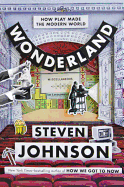
In his previous book, How We Got to Now, Steven Johnson examined the evolution of six inventions. In this follow-up, Wonderland, Johnson analyzes six entertainment categories, tracing the progression of simple elements of amusement or pleasure, such as shopping or illusion, into complex world-changing systems, like the Industrial Age or moving pictures. He calls it the "Hummingbird Effect." Johnson explains, "Everyone knows the old saying 'necessity is the mother of invention,' but if you do a paternity test on many of the modern world's most important ideas or institutions, you will find, invariably, that leisure and play were involved in the conception as well." To illustrate his point, he takes his audience on a winding trip through their DNA.
Using strong storytelling skills punctuated by frequent illustrations, Johnson presents fascinating history and science with captivating anecdotes and explanations. He explores beyond straightforward motivations like money or wealth, often trudging through devastating atrocities such as war and slavery, to show that simple delight and pleasure can lead to major historical and cultural changes. For instance, the European taste for spices prompted colonial exploitation, resulting in new forms of cartography and water travel.
From fashion to games, Wonderland demonstrates that observing play in current culture has the potential to open a window onto future innovations. This provocative journey promises to spark readers' curiosity, with Johnson's assortment of delights keeping them wondering what will be next. It will also have readers pondering their own pleasures, theorizing about changes the hummingbird's wings might provoke several centuries from now. --Jen Forbus, freelancer

